Note: This novel has just been chosen one of Publishers Weekly’s Best Books of 2011.
“In both [the Mahsud and the Wazir cultures], survival is the ultimate virtue. In neither community is any stigma attached to a hired assassin, a thief, a kidnapper, or an informer. Both [tribes] are totally absorbed in themselves. They have no doubt in their minds that they occupy center stage, while the rest of the world acts out minor roles or watches them as spectators – as befit inferior species.”
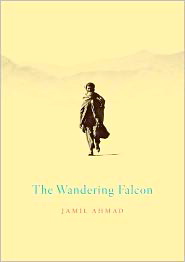 What an astonishing book! Completed in 1973 and packed away for almost forty years, the manuscript of The Wandering Falcon found a publisher only when the world’s attention suddenly focused on the virtually unknown tribal cultures living along the bloody border between Pakistan and Afghanistan. With great sensitivity, respect, and sympathy for his characters, seventy-nine-year-old author Jamil Ahmad has created a collection of unique interconnected stories about vibrant individuals from the various tribes living in and near the Federally Administered Tribal Area (FATA) of Pakistan. Nomads who have followed the seasons and the needs of their animals and families for thousands of years, these illiterate tribes have no concept of national boundaries. Every generation has moved constantly, driven by the need to find food and water for their sheep and camels, following traditional routes from Afghanistan to Pakistan in the autumn, then back to Afghanistan in the spring.
What an astonishing book! Completed in 1973 and packed away for almost forty years, the manuscript of The Wandering Falcon found a publisher only when the world’s attention suddenly focused on the virtually unknown tribal cultures living along the bloody border between Pakistan and Afghanistan. With great sensitivity, respect, and sympathy for his characters, seventy-nine-year-old author Jamil Ahmad has created a collection of unique interconnected stories about vibrant individuals from the various tribes living in and near the Federally Administered Tribal Area (FATA) of Pakistan. Nomads who have followed the seasons and the needs of their animals and families for thousands of years, these illiterate tribes have no concept of national boundaries. Every generation has moved constantly, driven by the need to find food and water for their sheep and camels, following traditional routes from Afghanistan to Pakistan in the autumn, then back to Afghanistan in the spring.
 The author, a powerful Pakistani official who lived and worked in the tribal lands from the early 1960s through the mid-1970s, believes that the people he came to know in the Swat Valley possessed a kind of honesty, openness, and lack of pretense which is absent from much of “civilized” society. Despite their willingness to shed blood against their enemies, Ahmad was able to trust them implicitly because he understood them, and, as he explains in an extensive interview with NPR, he believes that these tribal cultures were a powerful “countervailing force” against the Taliban and al-Qaeda extremism which we now see complicating these areas. With the individual tribal cultures now severely damaged, Ahmad believes that it is essential for “All of us to understand the tribes, to resonate, to harmonize, to have the same beat as the tribes. Because frankly speaking, I still think that each one of us has a tribal gene embedded inside.”
The author, a powerful Pakistani official who lived and worked in the tribal lands from the early 1960s through the mid-1970s, believes that the people he came to know in the Swat Valley possessed a kind of honesty, openness, and lack of pretense which is absent from much of “civilized” society. Despite their willingness to shed blood against their enemies, Ahmad was able to trust them implicitly because he understood them, and, as he explains in an extensive interview with NPR, he believes that these tribal cultures were a powerful “countervailing force” against the Taliban and al-Qaeda extremism which we now see complicating these areas. With the individual tribal cultures now severely damaged, Ahmad believes that it is essential for “All of us to understand the tribes, to resonate, to harmonize, to have the same beat as the tribes. Because frankly speaking, I still think that each one of us has a tribal gene embedded inside.”
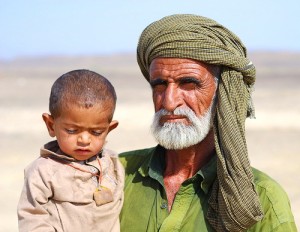 Opening with a haunting description of a lonely military outpost located “in the tangle of crumbling, weather-beaten, and broken hills where the borders of Iran, Pakistan, and Afghanistan meet,” Ahmad describes the arrival of a man, a woman, and their camel staggering out of the dust in desperate need of water. The Siahpad couple then asks for refuge, and in a show of the subtleties of the cultures and the laws, the leader of the outpost says, “Refuge I cannot offer. I know your laws well, and neither I nor any man of mine shall come between a man and the laws of his tribe…[but] shelter is yours for the asking. For as long as you wish it, for as long as you want to stay.” The unmarried couple, in which the man has run away with his master’s wife, lives there contentedly for six years, du
Opening with a haunting description of a lonely military outpost located “in the tangle of crumbling, weather-beaten, and broken hills where the borders of Iran, Pakistan, and Afghanistan meet,” Ahmad describes the arrival of a man, a woman, and their camel staggering out of the dust in desperate need of water. The Siahpad couple then asks for refuge, and in a show of the subtleties of the cultures and the laws, the leader of the outpost says, “Refuge I cannot offer. I know your laws well, and neither I nor any man of mine shall come between a man and the laws of his tribe…[but] shelter is yours for the asking. For as long as you wish it, for as long as you want to stay.” The unmarried couple, in which the man has run away with his master’s wife, lives there contentedly for six years, du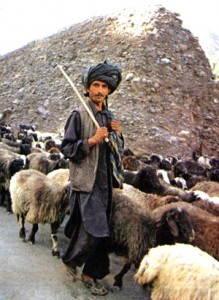 ring which time they have a son. When the “enforcer” of their tribe’s laws and his men finally do discover them, the inevitable “justice” happens. Shortly afterward, their tiny son, protected against the powerful wind by the body of the dead camel which once belonged to his family, is discovered and adopted by the old, nearly-blind leader of a group of Baluchis who have accepted an invitation to parley with Pakistani officials over their killing of two army officers. Ahmad emphasizes their honor and unwillingness to compromise – and also their naivete – as they meet with the government.
ring which time they have a son. When the “enforcer” of their tribe’s laws and his men finally do discover them, the inevitable “justice” happens. Shortly afterward, their tiny son, protected against the powerful wind by the body of the dead camel which once belonged to his family, is discovered and adopted by the old, nearly-blind leader of a group of Baluchis who have accepted an invitation to parley with Pakistani officials over their killing of two army officers. Ahmad emphasizes their honor and unwillingness to compromise – and also their naivete – as they meet with the government.
Eventually, the boy, who becomes known as Tor Baz, the Black Falcon, travels with the Kharots, a tribe of about a million people, who migrate regularly, en masse, from Afghanistan to Pakistan for the winter. Told at the border that they must have travel documents to enter the country, they are stymied. No one owns a birth certificate, or identification papers, or health documents: they have never had need of them. Emphasizing their traditions, pride, and sense of honor, the author shows their concern for their people and their herds, and also their inability to deal with what they regard as an assault on their heritage. They will not give in, no matter the cost.
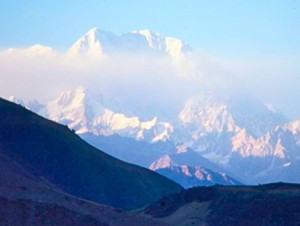 Tor Baz is the vehicle through whom similar stories are also told of hardship and official betrayal affecting the Pawindahs, the Wazirs, the Mahsuds, and the Mohmands. These groups all have their own languages and cultures, and some, like the Wazirs and the Mahsuds, even war against each other on a regular basis, while also warring against the larger, more “civilized” national government which they do not recognize. Fascinating battles of wits between the tribes and officials are unending, and lively stories concerning individuals reveal surprising aspects of the culture and give new meaning to the word “vengeance.” The story of a guide who regularly escorts climbers up the gigantic (and, at that point, unconquered) mountain of Tirich Mir and what happens after the mountain is eventually conquered provides particularly surprising insights. The attitudes toward the wives and daughters in these tribes, accepted by the women themselves, will horrify the western reader. Slavery is explicitly allowed by Islam, and the casual purchase and sale of women goes on, with all its horrors, in this novel.
Tor Baz is the vehicle through whom similar stories are also told of hardship and official betrayal affecting the Pawindahs, the Wazirs, the Mahsuds, and the Mohmands. These groups all have their own languages and cultures, and some, like the Wazirs and the Mahsuds, even war against each other on a regular basis, while also warring against the larger, more “civilized” national government which they do not recognize. Fascinating battles of wits between the tribes and officials are unending, and lively stories concerning individuals reveal surprising aspects of the culture and give new meaning to the word “vengeance.” The story of a guide who regularly escorts climbers up the gigantic (and, at that point, unconquered) mountain of Tirich Mir and what happens after the mountain is eventually conquered provides particularly surprising insights. The attitudes toward the wives and daughters in these tribes, accepted by the women themselves, will horrify the western reader. Slavery is explicitly allowed by Islam, and the casual purchase and sale of women goes on, with all its horrors, in this novel.
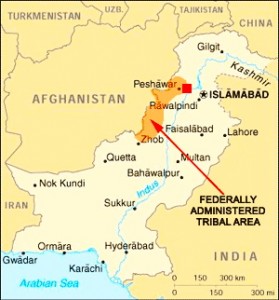 Almost two generations have passed since Jamil Ahmad’s stories of these tribal areas were written, and much that he foreshadowed has occurred. The nomadic tribes have been particularly vulnerable, easily displaced by those who could take over “their” tribal lands during their yearly migrations. Though some migration apparently still takes place, the widespread migrations by large tribes across national borders appears to have ended. As early as the 1970s, the author points out, the Gujjahs recognized that their days were numbered and decided to teach their children to blend into Pathan society and to learn the Pashto language. Other tribes have undoubtedly followed that lead. The fact that only one author, Jamil Ahmad, has recorded the vibrant lives of these illiterate tribes, emphasizing their honor, honesty, and most importantly, their cultural vulnerability, in the years immediately before major changes took place, makes this one of the most important books of the age, not just for anthropological reasons, but for the universal truths which the tribes reflected.
Almost two generations have passed since Jamil Ahmad’s stories of these tribal areas were written, and much that he foreshadowed has occurred. The nomadic tribes have been particularly vulnerable, easily displaced by those who could take over “their” tribal lands during their yearly migrations. Though some migration apparently still takes place, the widespread migrations by large tribes across national borders appears to have ended. As early as the 1970s, the author points out, the Gujjahs recognized that their days were numbered and decided to teach their children to blend into Pathan society and to learn the Pashto language. Other tribes have undoubtedly followed that lead. The fact that only one author, Jamil Ahmad, has recorded the vibrant lives of these illiterate tribes, emphasizing their honor, honesty, and most importantly, their cultural vulnerability, in the years immediately before major changes took place, makes this one of the most important books of the age, not just for anthropological reasons, but for the universal truths which the tribes reflected.
Photos, in order: The author’s photo is from http://www.outlookindia.com
The photo of a Baluchi elder and child appears on http://balochipics.blogspot.com
A Zhob tribesman, living in the northwest part of Baluchistan, tends his flock. This photo was taken in 2007. http://www.khyber.org
Tirich Mir, a majestic mountain which soars 25,253 feet high, was first conquered by Arne Naess in 1950. The mountain is in northwest Pakistan along the Afghan border. http://homepages.wmich.edu
The map of the Federally Administered Tribal Lands is from http://www.pakistankakhudahafiz.com
